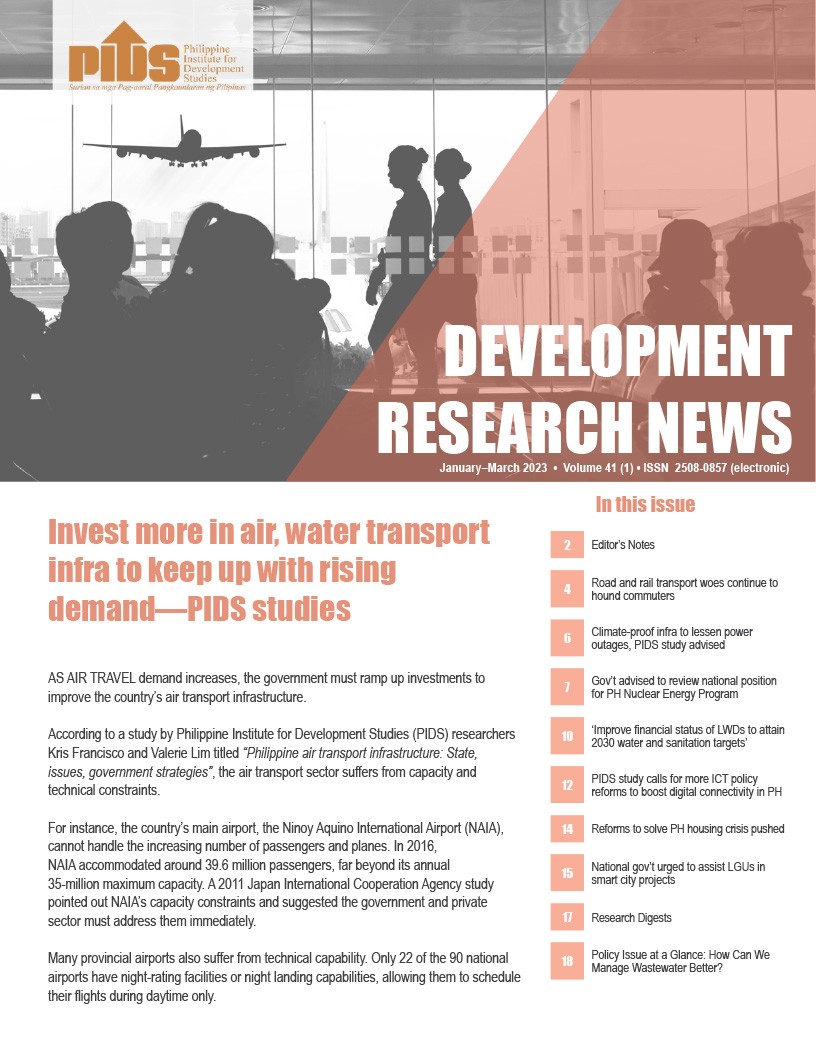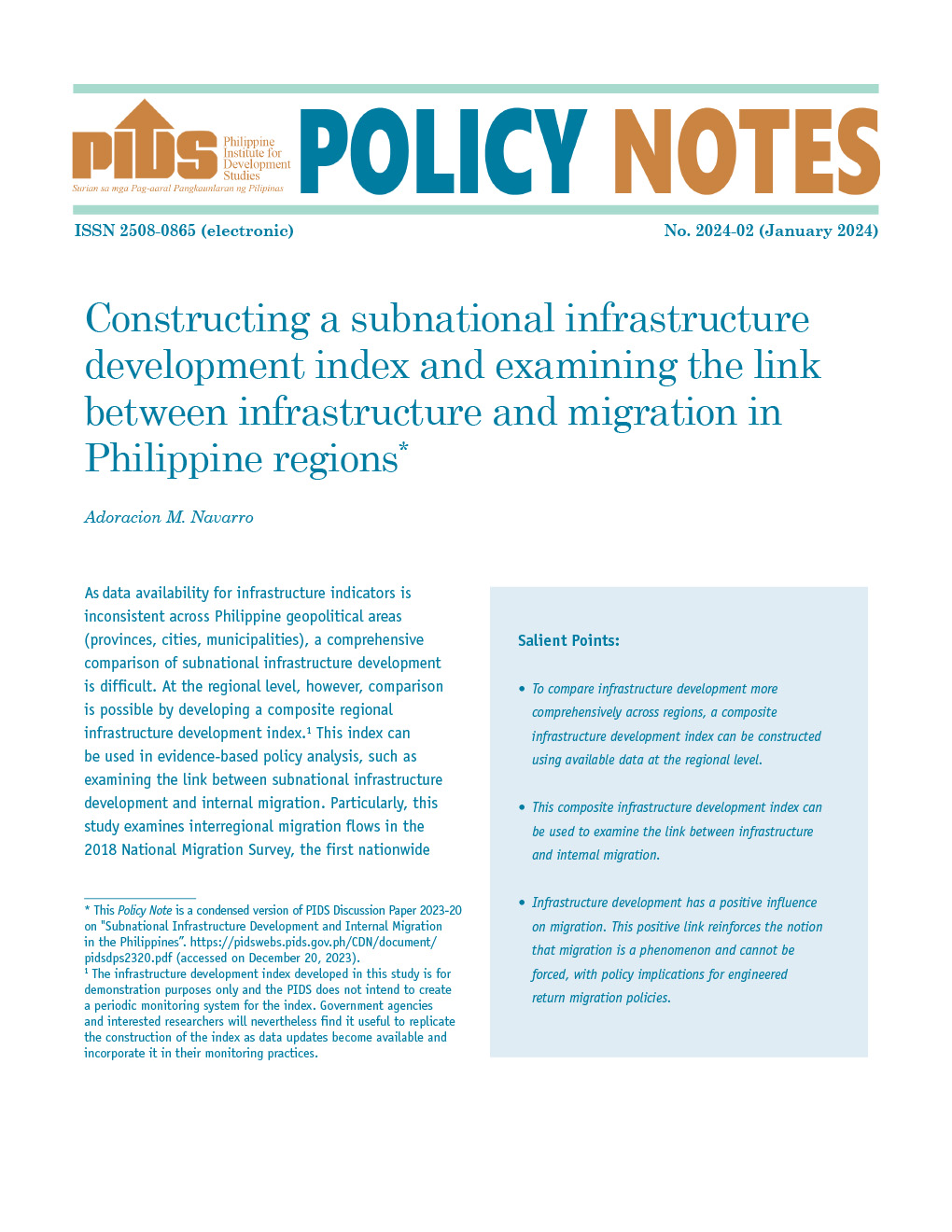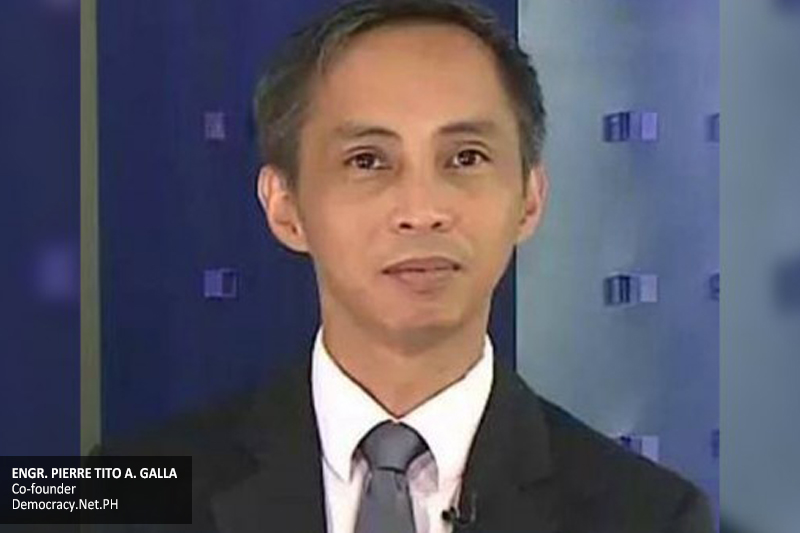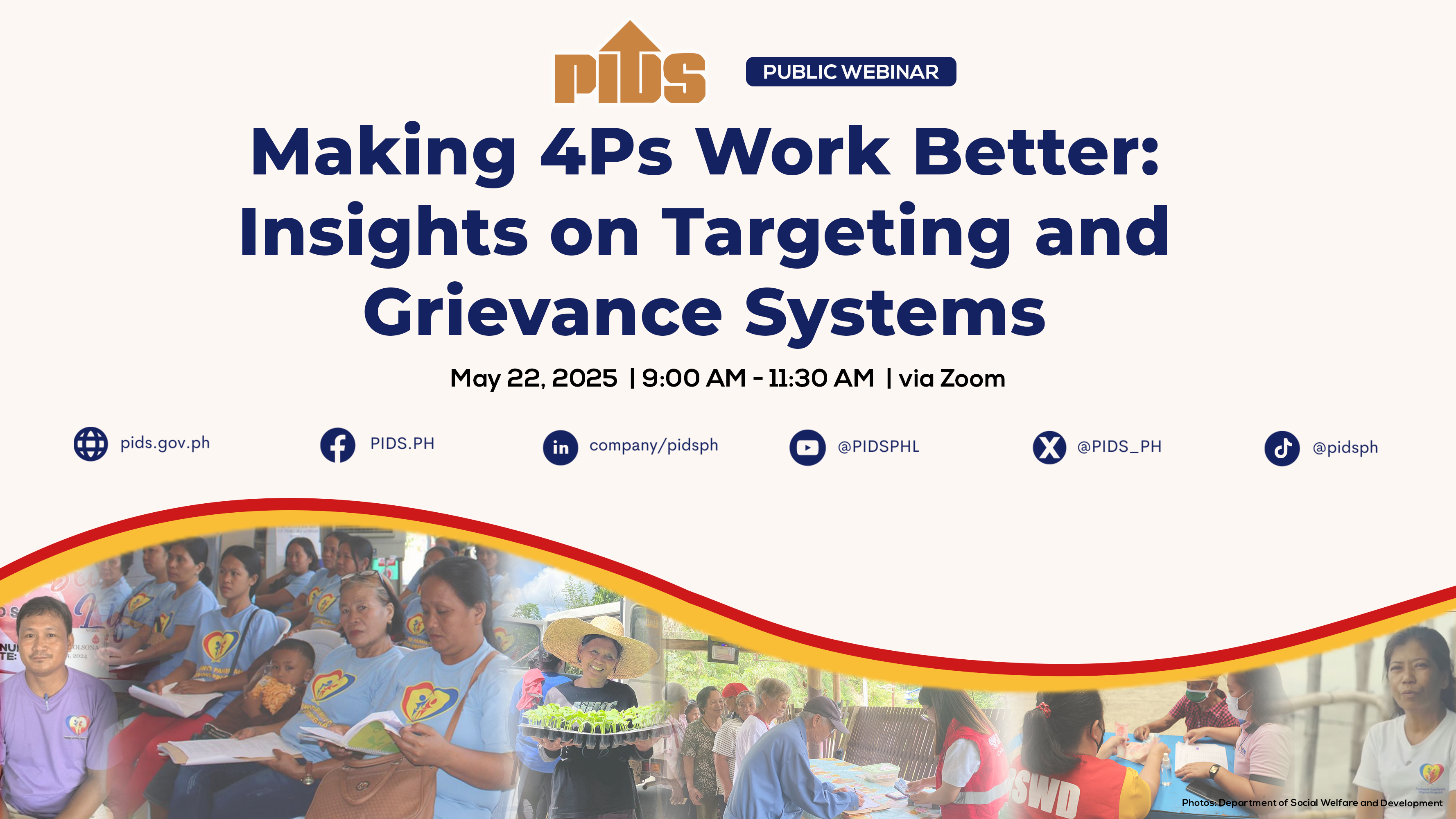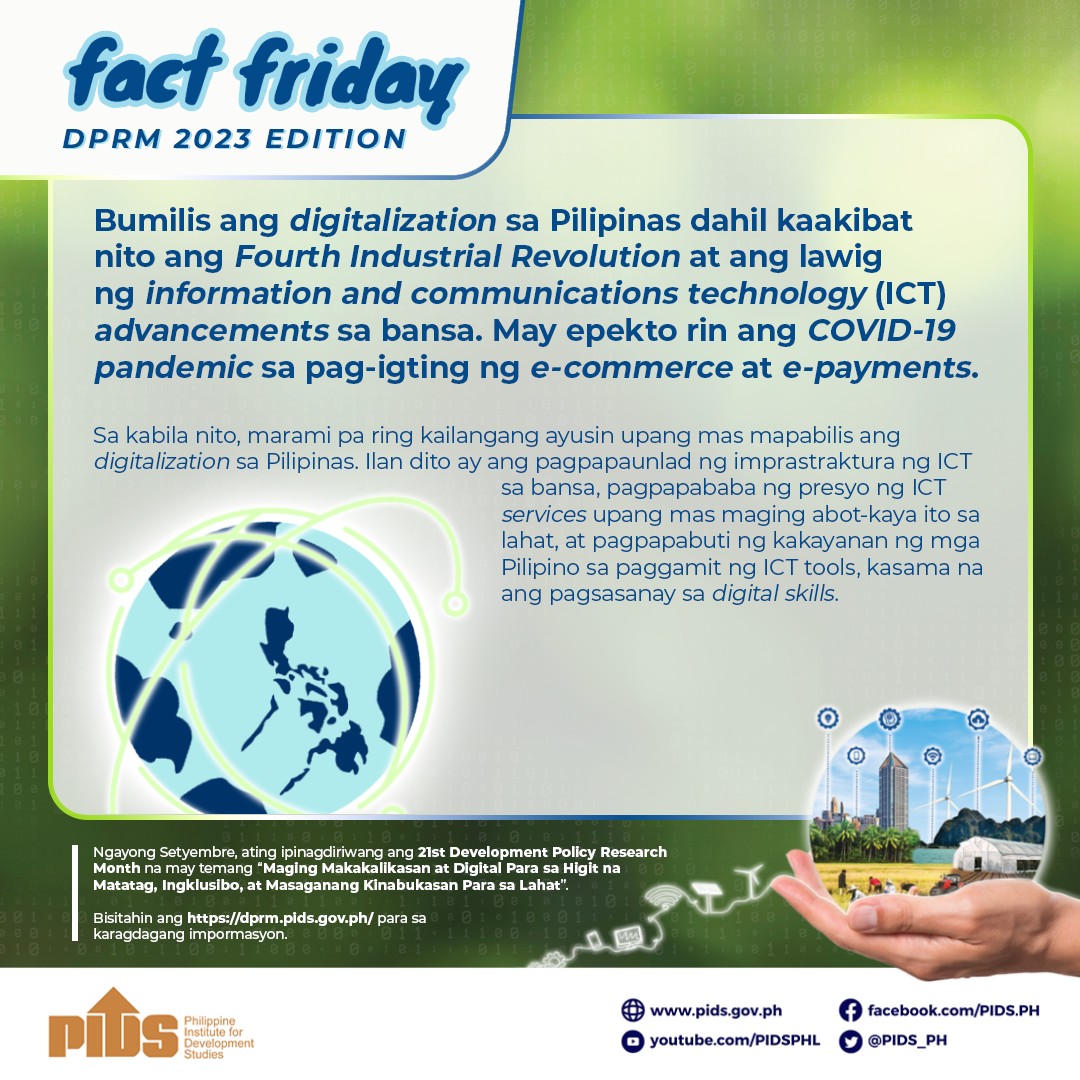The PCC stands by its position that Globe and PLDT should not have proceeded with the payment of their final installment on the telco deal, considering pending cases filed before the Supreme Court (SC) and Court of Appeals (CA),” the competition watchdog said.
Completing the payment for the telco assets is a move that unduly preempts the forthcoming rulings of the SC and CA,” it added.
PLDT shares dropped P32 or 1.82% to close at P1,728.00 apiece, while Globe shares rose P8 or 0.38% to end at P2,110 each.
The quality of the Philippine telecommunication regulatory environment is significantly below international standards, according to a recent study of state think tank Philippine Institute for Development Studies (PIDS).
Notably, PIDS authors released their study in time also for a statement by the Philippine Competition Commission, which strongly criticized the move of telephone companies (telcos) Globe and PLDT to proceed with the payment of their final installment on the P69 billion acquisition of San Miguel Corp.’s telecommunications unit considering pending cases filed before the Supreme Court and Court of Appeals.
Completing the payment for the telco assets is a move that unduly preempts the forthcoming rulings of the SC and CA,” the PCC said.
The PIDS study, authors Ma. Kristina Ortiz, Ramonette Serafica, and Jose Carlos Alexis Bairan explained that the Philippines has an overall rating of 52.50, which is midway of the ideal level in the scoring system set by the International Telecommunications Union.
This makes the Philippines the second lowest among seven Southeast Asian countries assessed. The other six are Singapore, Malaysia, Thailand, Vietnam, Myanmar, and Cambodia.
The seven countries were assessed in four clusters: regulatory authority, regulatory mandate, regulatory regime, and the competition framework. <
Of the four clusters, the Philippines scored lowest in the regulatory regime with only 7 out of 30 points (23%).
Regulatory regime reviews specific regulatory interventions and covers the kind of targeted regulation needed to promote a healthy competitive environment.
For one, the Philippines does not issue global/unified licenses, which is considered optimal and reflects increased market liberalization in the global market.
Like Myanmar, it does not compel operators to make publicly available information about interconnection. Myanmar, however, requires quality of service monitoring but not the Philippines.
The absence of number portability, or the ability of mobile phone users to retain their mobile number when changing from one mobile network carrier to another, is also considered a weakness of Philippine telcos.
Policies that will reduce customer switching and search costs, as well as the promotion of the efficient use of facilities, embedding adequate monitoring and data reporting, and clearly specifying obligations or rules of conduct of various market players are seen as possible interventions to improve telcos in the country,” the authors pointed out.
Another flaw of Philippine telcos is on regulatory mandate, which evaluates the various regulatory functions of the regulator based on its thrusts.
In this cluster, the Philippines ranks second lowest with 10.5 next to Myanmar with 7.5 out of a possible 22 points.
The low score of the Philippines can be attributed to a number of factors such as the lack of regulatory mandate over interconnection rates and universal access/service.
In the Philippines, acquiring the necessary authorization to provide telecommunications services is done in two levels. One is a license obtained from Congress and the other is a certificate from the National Telecommunications Commission (NTC).
Based on international standards, the first step is no longer necessary,” the authors explained, arguing that “Congress should no longer be involved in granting franchises as the regulator should have the sole authority for licensing.
The authors also noted that while the NTC can revoke licenses and impose fines, still, it implements weak penalties. “On the one end, revocation of a license will only happen in extreme cases, and the decision can be challenged in [the] courts since the NTC is a quasi-judicial body,” they posited.
Ortiz and her co-authors also took note of the NTC’s implementation of ‘unrealistically low fines’ prescribed by old laws like the Public Services Act of 1936 (Commonwealth Act 146) that sets a fine of not more than P200 per day.
To improve the efficiency of Philippine telcos, the authors proposed the restructuring of the NTC to ensure its independence, diversifying its sources of funding, and allowing the NTC to set higher, more appropriate fines to deter bad behavior.
In its statement, PCC said this big ticket deal goes beyond the purchase itself because of its impact on public interest. As with any transaction required to be notified to PCC, the P69.1-billion deal needs to be reviewed through a market competition lens to safeguard consumer welfare over the long term.
While PCC guarantees fair evaluation for every notification, compliance with the law should nevertheless be complete and transparent. Notifications should not be filed merely for the sake of submission.
This telco deal review would have been completed earlier if only the parties submitted the required notification.
The PCC may be fairly new and companies are still adjusting to the regulatory framework of the Philippine Competition Act, but they must strictly adhere to the law. Globe and PLDT should not be exempted,” PCC
Completing the payment for the telco assets is a move that unduly preempts the forthcoming rulings of the SC and CA,” it added.
PLDT shares dropped P32 or 1.82% to close at P1,728.00 apiece, while Globe shares rose P8 or 0.38% to end at P2,110 each.
The quality of the Philippine telecommunication regulatory environment is significantly below international standards, according to a recent study of state think tank Philippine Institute for Development Studies (PIDS).
Notably, PIDS authors released their study in time also for a statement by the Philippine Competition Commission, which strongly criticized the move of telephone companies (telcos) Globe and PLDT to proceed with the payment of their final installment on the P69 billion acquisition of San Miguel Corp.’s telecommunications unit considering pending cases filed before the Supreme Court and Court of Appeals.
Completing the payment for the telco assets is a move that unduly preempts the forthcoming rulings of the SC and CA,” the PCC said.
The PIDS study, authors Ma. Kristina Ortiz, Ramonette Serafica, and Jose Carlos Alexis Bairan explained that the Philippines has an overall rating of 52.50, which is midway of the ideal level in the scoring system set by the International Telecommunications Union.
This makes the Philippines the second lowest among seven Southeast Asian countries assessed. The other six are Singapore, Malaysia, Thailand, Vietnam, Myanmar, and Cambodia.
The seven countries were assessed in four clusters: regulatory authority, regulatory mandate, regulatory regime, and the competition framework. <
Of the four clusters, the Philippines scored lowest in the regulatory regime with only 7 out of 30 points (23%).
Regulatory regime reviews specific regulatory interventions and covers the kind of targeted regulation needed to promote a healthy competitive environment.
For one, the Philippines does not issue global/unified licenses, which is considered optimal and reflects increased market liberalization in the global market.
Like Myanmar, it does not compel operators to make publicly available information about interconnection. Myanmar, however, requires quality of service monitoring but not the Philippines.
The absence of number portability, or the ability of mobile phone users to retain their mobile number when changing from one mobile network carrier to another, is also considered a weakness of Philippine telcos.
Policies that will reduce customer switching and search costs, as well as the promotion of the efficient use of facilities, embedding adequate monitoring and data reporting, and clearly specifying obligations or rules of conduct of various market players are seen as possible interventions to improve telcos in the country,” the authors pointed out.
Another flaw of Philippine telcos is on regulatory mandate, which evaluates the various regulatory functions of the regulator based on its thrusts.
In this cluster, the Philippines ranks second lowest with 10.5 next to Myanmar with 7.5 out of a possible 22 points.
The low score of the Philippines can be attributed to a number of factors such as the lack of regulatory mandate over interconnection rates and universal access/service.
In the Philippines, acquiring the necessary authorization to provide telecommunications services is done in two levels. One is a license obtained from Congress and the other is a certificate from the National Telecommunications Commission (NTC).
Based on international standards, the first step is no longer necessary,” the authors explained, arguing that “Congress should no longer be involved in granting franchises as the regulator should have the sole authority for licensing.
The authors also noted that while the NTC can revoke licenses and impose fines, still, it implements weak penalties. “On the one end, revocation of a license will only happen in extreme cases, and the decision can be challenged in [the] courts since the NTC is a quasi-judicial body,” they posited.
Ortiz and her co-authors also took note of the NTC’s implementation of ‘unrealistically low fines’ prescribed by old laws like the Public Services Act of 1936 (Commonwealth Act 146) that sets a fine of not more than P200 per day.
To improve the efficiency of Philippine telcos, the authors proposed the restructuring of the NTC to ensure its independence, diversifying its sources of funding, and allowing the NTC to set higher, more appropriate fines to deter bad behavior.
In its statement, PCC said this big ticket deal goes beyond the purchase itself because of its impact on public interest. As with any transaction required to be notified to PCC, the P69.1-billion deal needs to be reviewed through a market competition lens to safeguard consumer welfare over the long term.
While PCC guarantees fair evaluation for every notification, compliance with the law should nevertheless be complete and transparent. Notifications should not be filed merely for the sake of submission.
This telco deal review would have been completed earlier if only the parties submitted the required notification.
The PCC may be fairly new and companies are still adjusting to the regulatory framework of the Philippine Competition Act, but they must strictly adhere to the law. Globe and PLDT should not be exempted,” PCC

